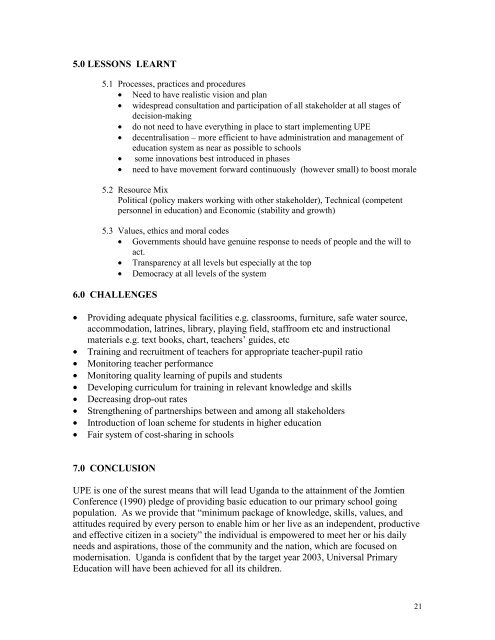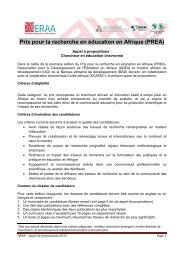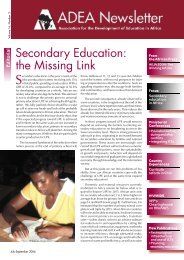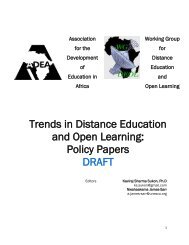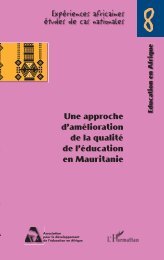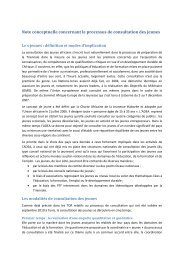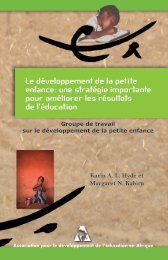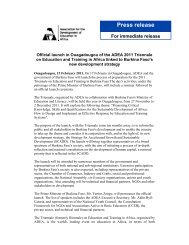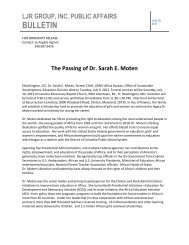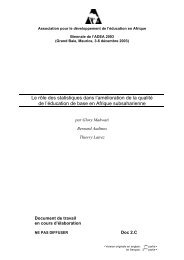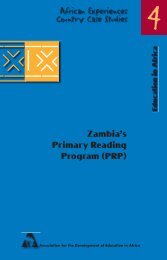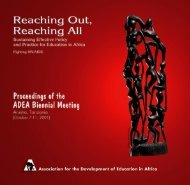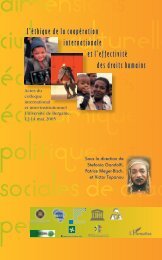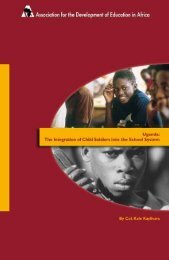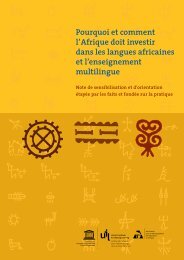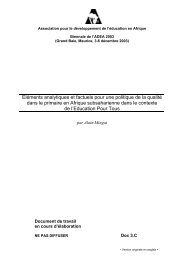the ugandan experience of universal primary education (upe) - ADEA
the ugandan experience of universal primary education (upe) - ADEA
the ugandan experience of universal primary education (upe) - ADEA
Create successful ePaper yourself
Turn your PDF publications into a flip-book with our unique Google optimized e-Paper software.
5.0 LESSONS LEARNT<br />
5.1 Processes, practices and procedures<br />
• Need to have realistic vision and plan<br />
• widespread consultation and participation <strong>of</strong> all stakeholder at all stages <strong>of</strong><br />
decision-making<br />
• do not need to have everything in place to start implementing UPE<br />
• decentralisation – more efficient to have administration and management <strong>of</strong><br />
<strong>education</strong> system as near as possible to schools<br />
• some innovations best introduced in phases<br />
• need to have movement forward continuously (however small) to boost morale<br />
5.2 Resource Mix<br />
Political (policy makers working with o<strong>the</strong>r stakeholder), Technical (competent<br />
personnel in <strong>education</strong>) and Economic (stability and growth)<br />
5.3 Values, ethics and moral codes<br />
• Governments should have genuine response to needs <strong>of</strong> people and <strong>the</strong> will to<br />
act.<br />
• Transparency at all levels but especially at <strong>the</strong> top<br />
• Democracy at all levels <strong>of</strong> <strong>the</strong> system<br />
6.0 CHALLENGES<br />
• Providing adequate physical facilities e.g. classrooms, furniture, safe water source,<br />
accommodation, latrines, library, playing field, staffroom etc and instructional<br />
materials e.g. text books, chart, teachers’ guides, etc<br />
• Training and recruitment <strong>of</strong> teachers for appropriate teacher-pupil ratio<br />
• Monitoring teacher performance<br />
• Monitoring quality learning <strong>of</strong> pupils and students<br />
• Developing curriculum for training in relevant knowledge and skills<br />
• Decreasing drop-out rates<br />
• Streng<strong>the</strong>ning <strong>of</strong> partnerships between and among all stakeholders<br />
• Introduction <strong>of</strong> loan scheme for students in higher <strong>education</strong><br />
• Fair system <strong>of</strong> cost-sharing in schools<br />
7.0 CONCLUSION<br />
UPE is one <strong>of</strong> <strong>the</strong> surest means that will lead Uganda to <strong>the</strong> attainment <strong>of</strong> <strong>the</strong> Jomtien<br />
Conference (1990) pledge <strong>of</strong> providing basic <strong>education</strong> to our <strong>primary</strong> school going<br />
population. As we provide that “minimum package <strong>of</strong> knowledge, skills, values, and<br />
attitudes required by every person to enable him or her live as an independent, productive<br />
and effective citizen in a society” <strong>the</strong> individual is empowered to meet her or his daily<br />
needs and aspirations, those <strong>of</strong> <strong>the</strong> community and <strong>the</strong> nation, which are focused on<br />
modernisation. Uganda is confident that by <strong>the</strong> target year 2003, Universal Primary<br />
Education will have been achieved for all its children.<br />
21


